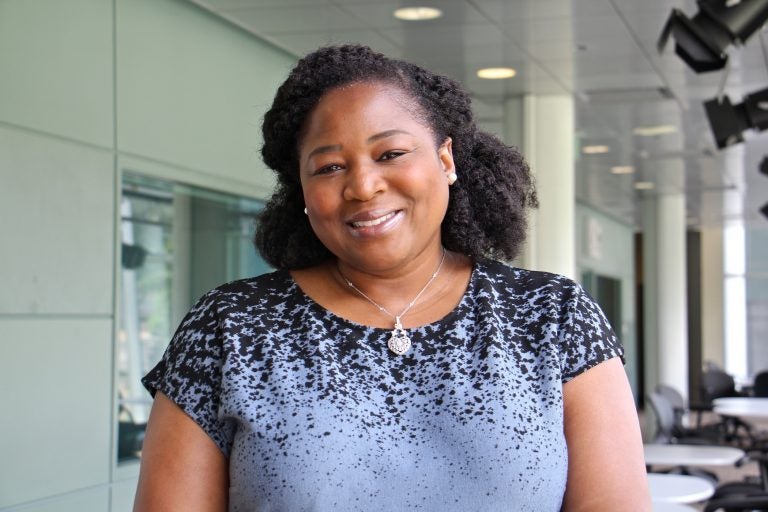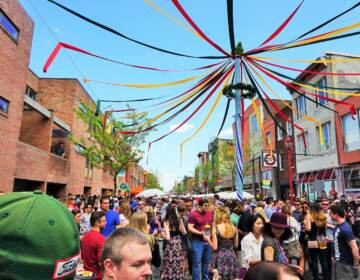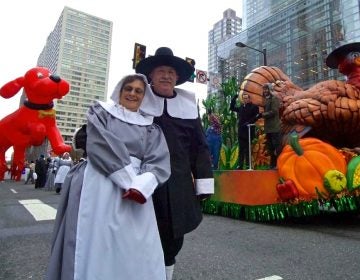The sanctuary of story
I didn’t know how to articulate true stories without also reliving the loss of the community and people who had once been close to me.

Jos Duncan is chief storyteller at Love Now Media, a social enterprise with a mission to tell stories through media. (Emma Lee/WHYY)
I grew up in the heart of North Philadelphia. My family’s house was right up 22nd Street, off of Cumberland.
Not too far away, on Lambert street, there was a woman named Mrs. Bain who used to tailor all of my dresses for special occasions — Easter Sunday and church functions. To match those dresses, I went to the Hollywood Shoes store on Columbia Avenue.
I will always remember the excitement of placing my foot on the cold steel to have it measured so that every pair of shoes fit perfectly.
My Aunt Dorothy gave me my first job at Jones Tabernacle AME Church credit union, the church right down the
street. She also enrolled me in the Youth NAACP, and she taught me to campaign for politicians running to represent North Philly. This community was my training ground for serving people, learning to care about people’s concerns, and loving people.
The community changed in the late ’80s, and so did the landscape of my teenage life. I had been groomed to be a leader. But, by the time I was 15, my father was deceased and my mother was addicted to drugs. This kind of change was also happening to the families of friends, cousins, and neighbors.
My passion for community service dissipated as I tried to figure out how to navigate life amid these changes and without parental support. I got good grades, graduated from high school with honors and continued on to
college.
I started a career in technology, and my community service was limited to teaching a few classes to kids at a city recreation center. But there was an emptiness in me that grew out of disappointment for all the loss I’d witnessed. I didn’t know how to address it, so I tried to find contentment in knowing I had overcome the odds.
In the late 2000s, Philadelphia was one of the most violent major cities in the U.S. The media reported each
incident: “Murder victim number 201, number 265, number 307 …” and it helped feed the sensationalism.
The victims were often from North Philly. I lost several friends to violence, and I knew others — a friend of a friend; a cousin of a neighbor; a guy I used to work with. The news of these deaths was always startling — sometimes there were photos or mugshots, video clips of a family member speaking. But I felt that the news never really told their stories.
One day, during this string of sensationalized numeric reporting, I sat in a corner Chinese store waiting for my order. A squad of kids walked in, making jokes about how they would be the next numbers. They formed their little fingers into imaginary guns and pointed them at each other. There was a direct relationship between what the media was saying about the community and what the kids were saying about their community.
These kids had never known the neighborhood I experienced. Of grandparents who swept the streets every Saturday or that there was once a tailor down the block who could make fancy dresses. They didn’t know that many of the addicts they saw daily were once teachers, accountants, and committee people.
Nearly forgotten memories rise
I had almost forgotten too. I had been so focused on my personal survival and success that I was numb to memories. In that moment, as those children entertained themselves with violent narratives, I knew that what I remembered mattered.
I questioned them, asked them what they knew about the people who were being reported on in the news, and then I asked them about their own communities.
“How do you get to school every day?”
“Who is the oldest person on your block?”
“What was this neighborhood known for before it was ‘bad’?”
I talked to them about the importance of seeking out and telling the kind of stories that empowered them. And I was moved to do something — to tell more stories about the rich culture I experienced and then witnessing it
all change.
But I was torn. I didn’t know how to articulate true stories without also reliving the loss of the community and people who had once been close to me.
I could not tell stories of Mrs. Bain, the tailor, without feeling the pain over the violent loss of my childhood friends Roni and Ron Ron. I could not relay memories of Jones Tabernacle AME Church without thinking about my cousin who was gunned down by police on Gratz Street.
Before Trayvon, Michael Brown, and the Black Lives Matter movement, I did not know how to word my truth in a way that would offer hope without dwelling on my own loss.
My confusion over which stories to tell led me to a woman named Linda Goss, an author who had written books about African folklore. She spent hours with me, teaching me folktales, and she affirmed that my reason for wanting to tell stories would lead me to everything I needed to know.
Finding the words
When Linda told stories, she used strings of bells and would ask listeners to repeat after her as she said, “Well, oh well, well”… She would sing a song about a caterpillar becoming a butterfly or about Br’er Rabbit outsmarting Br’er Tiger. It was as if there was a secret Griot’s code of wisdom that she helped me to understand.
I turned my story of losing my community into a tale of a little lion cub who didn’t know she could roar. I learned traditional folktales such as “The People Could Fly” — and instead of having people fly from enslavement, I made them fly in the face of police brutality.
I also learned the tales of Anansi, the powerful trickster of African lore. The stories where magic, a form of resilience. I told the traditional stories of war and loss — and made them about my North Philadelphia community. Equipped with these stories, I gained the power to go directly into communities to empower people with narratives that stood to restore hope in places where stories were often lost on concrete or sensationalized for 30 seconds in a news cycle.
The stories were my sanctuary. In them, I found my voice. I found a way to reconnect with humanity,
to forgive, and to heal.
—
Jos Duncan is a multimedia producer, social entrepreneur, and Chief Storyteller at Love Now Media, a social enterprise with a mission to tell stories through media production and communications initiatives that lean towards justice, wellness, and equity.
WHYY is your source for fact-based, in-depth journalism and information. As a nonprofit organization, we rely on financial support from readers like you. Please give today.




